When it comes to getting pregnant, there are a lot of things to think about – for both humans and animals. For example, is it dangerous for a kitten to get pregnant?
In this blog post, we will discuss the risks associated with pregnancy in kittens, as well as what you can do to help keep your furry friend safe and healthy.
- Is It Dangerous For a Kitten To Get Pregnant?
- What Happens If a Kitten Gets Pregnant?
- Can a Kitten Get Pregnant At 2 Months Old?
- At What Age Is It Safe For a Kitten To Get Pregnant?
- Can My Cat’s Kitten Get Her Pregnant?
- What Happens During a Normal Cat Birth?
- How Can I Prevent My Kitten From Getting Pregnant?
- When Can Cats Become Pregnant Again?
- How Many Times Can a Cat Get Pregnant in a Year?
- FAQ: Is it dangerous for a kitten to get pregnant?
- Q: At what age can a female kitten get pregnant?
- Q: Can a kitten give birth to a litter of kittens safely?
- Q: What should I do if I suspect my kitten is pregnant?
- Q: How many kittens can a cat have in one litter?
- Q: Is it dangerous for a cat to have too many kittens?
- Q: Can a male kitten get another cat pregnant?
- Q: What should I feed my pregnant kitten?
- Q: What should I do if my cat is about to give birth?
- Q: What is the best way to care for newborn kittens?
- Q: When should I get my kitten spayed or neutered?
- In Conclusion
Key Takeaway
- It can be dangerous for a kitten to get pregnant as she hasn’t fully matured yet; this can pose risks to both her and her offspring’s health.
- If a kitten gets pregnant, it may face significant health risks due to its young age, including complications during pregnancy or birth, and potential harm to its ongoing growth and development.
- While kittens can technically become pregnant as young as four months old, it’s safer for their health and development if they are fully grown before getting pregnant, typically around 18-24 months of age.
Is It Dangerous For a Kitten To Get Pregnant?
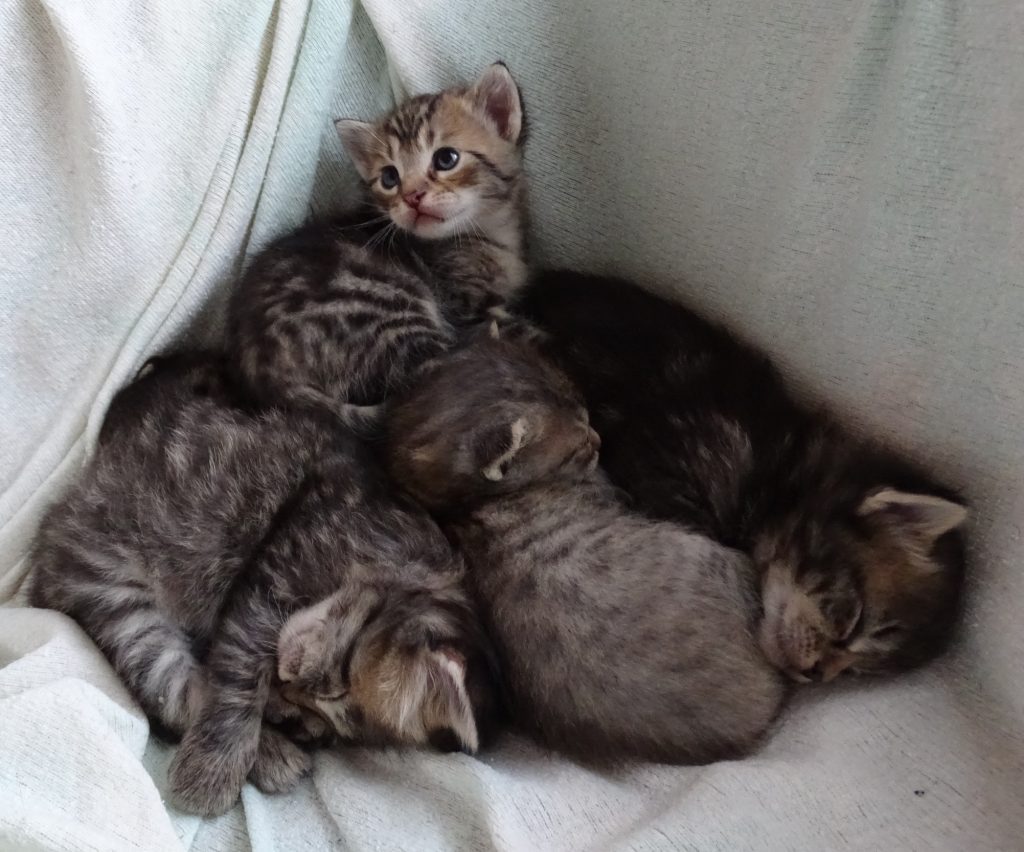
Pregnancy in kittens, especially those under one year of age, can pose significant health risks due to their undeveloped bodies.
As a veterinarian, it’s been my experience that kittens bearing kittens is a challenging situation.
The mother cat herself is still growing and developing, and the added burden of carrying and nourishing a litter can put her under immense physical stress.
Complications during delivery are also more prevalent as her body hasn’t fully matured to handle the process of giving birth.
I’ve seen cases where the mother cat and her kittens suffer from malnutrition because she’s unable to provide adequately for herself and her litter.
In extreme cases, the young mother may require a cesarean section, which carries its own set of risks.
Based on these experiences, I always recommend spaying female cats before they reach sexual maturity to prevent such scenarios.
What Happens If a Kitten Gets Pregnant?
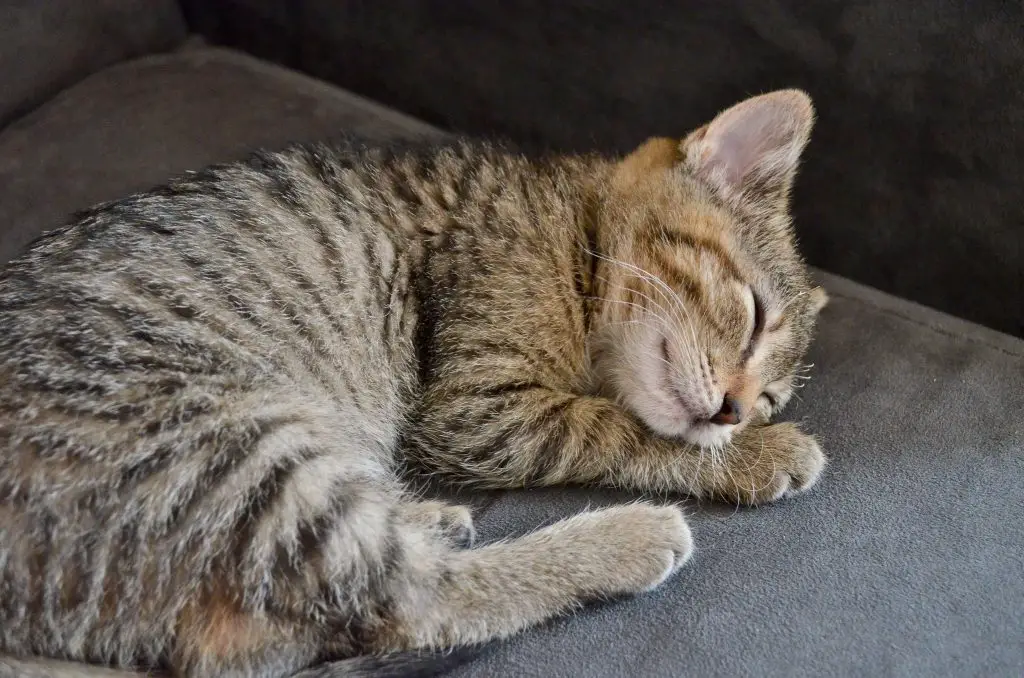
A kitten getting pregnant can lead to significant health risks due to the physical strain on her still-developing body, increased likelihood of delivery complications, and potential for malnutrition for both mother and kittens.
In my years as a veterinarian, I’ve observed that when a kitten, who is still growing herself, becomes pregnant, it introduces a myriad of challenges.
The physical demand of carrying a litter can exhaust her developing body, leading to various health issues.
Delivery complications are often heightened in these cases because her underdeveloped body may struggle to handle the birthing process.
Post-delivery, it’s common for the young mother and her kittens to suffer from malnutrition.
The mother cat, still growing herself, struggles to provide adequate nourishment for her offspring while maintaining her own health.
In severe cases, a cesarean section may be needed, introducing another set of risks.
Based on these experiences, I always encourage owners to have their female cats spayed before they reach sexual maturity to prevent such complications says Vet Help Direct.
Can a Kitten Get Pregnant At 2 Months Old?
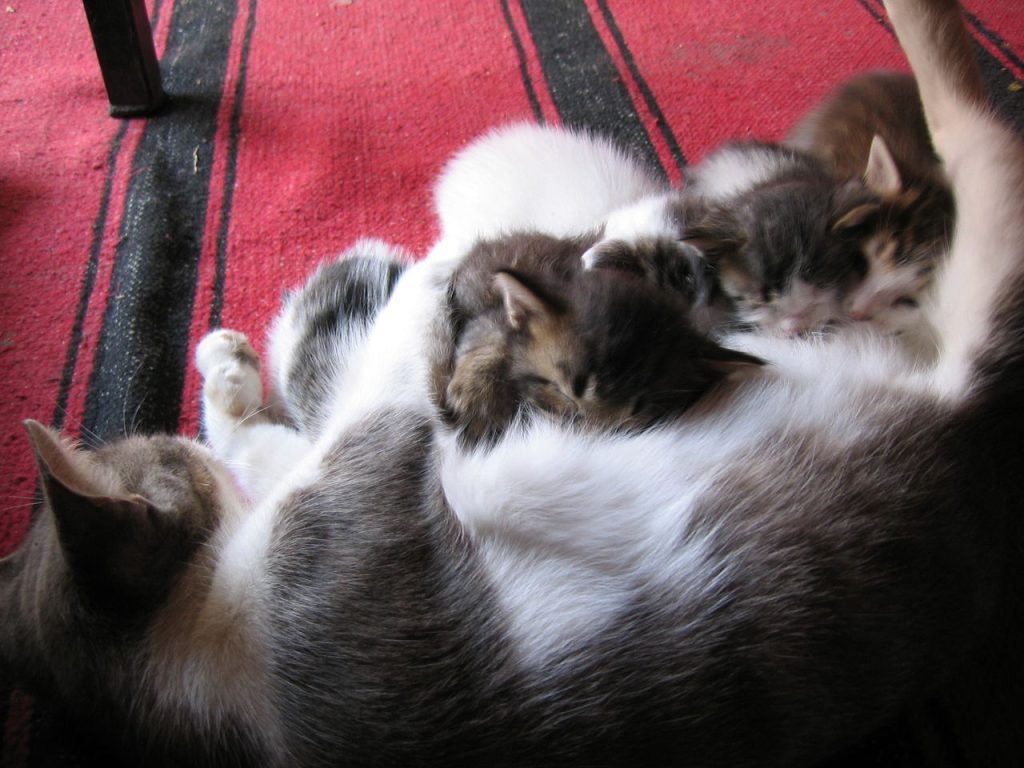
A kitten cannot get pregnant at 2 months old, as sexual maturity in cats typically begins around the age of 4 to 6 months.
Speaking from my years of experience as a veterinarian, female kittens generally start to reach sexual maturity and go into heat when they are between 4 to 6 months old.
This is the period when they can first become pregnant. At 2 months old, a kitten is still very much a baby herself and her body is not yet capable of carrying or delivering kittens.
However, it’s important to note that once a kitten does reach sexual maturity, she can go into heat and become pregnant quite quickly if not spayed.
That’s why I always advise cat owners to consider having their pets spayed around the age of 4 months, before they come into heat for the first time, to prevent unwanted pregnancies and the potential health risks associated with them.
See also: Do Cats Bleed Before Giving Birth?
At What Age Is It Safe For a Kitten To Get Pregnant?
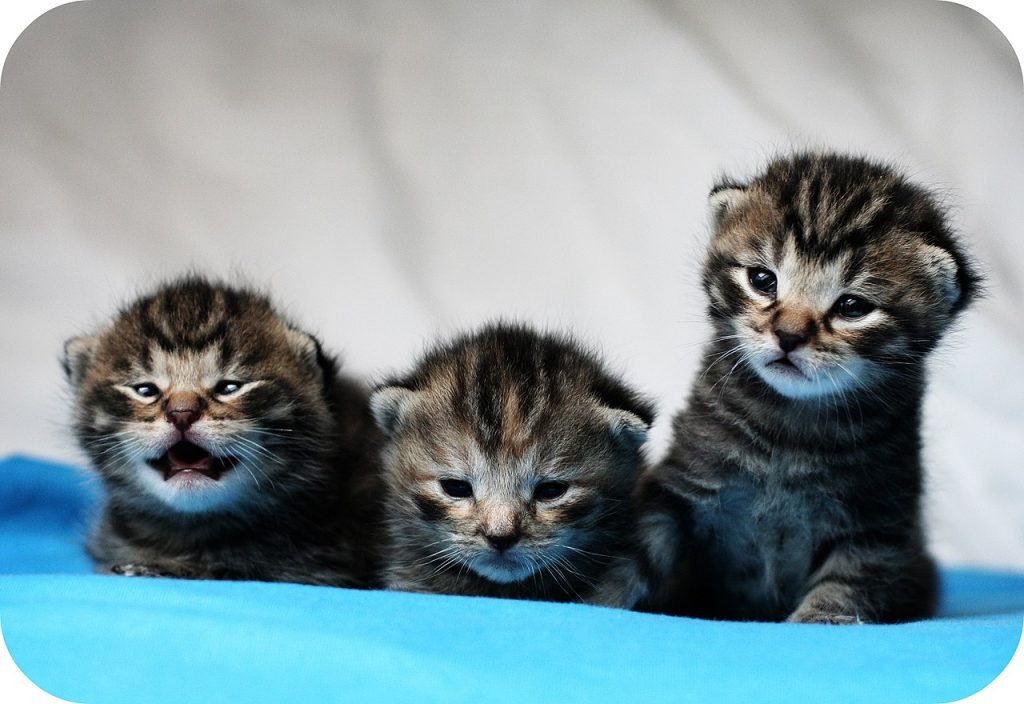
It’s generally safe for a cat to get pregnant once she has reached one year of age, as this allows her body to fully mature and better handle the physical demands of pregnancy.
From my experience as a veterinarian, I’ve found that while cats can start going into heat and become capable of getting pregnant as early as 4 to 6 months old, their bodies at this age are still developing and may not be fully equipped to handle a pregnancy.
Waiting until a cat is at least one year old gives her body more time to mature, reducing the risk of complications during pregnancy and delivery.
However, it’s important to remember that each cat is unique and factors such as breed, health status, and individual development can influence the optimal age for pregnancy.
Therefore, if you’re considering breeding your cat, I strongly recommend having a thorough discussion with your vet to determine the best timing and approach.
In general, to prevent unwanted pregnancies and associated health risks, spaying is recommended for cats who are not intended for breeding says The Vet Whetstone.
Can My Cat’s Kitten Get Her Pregnant?
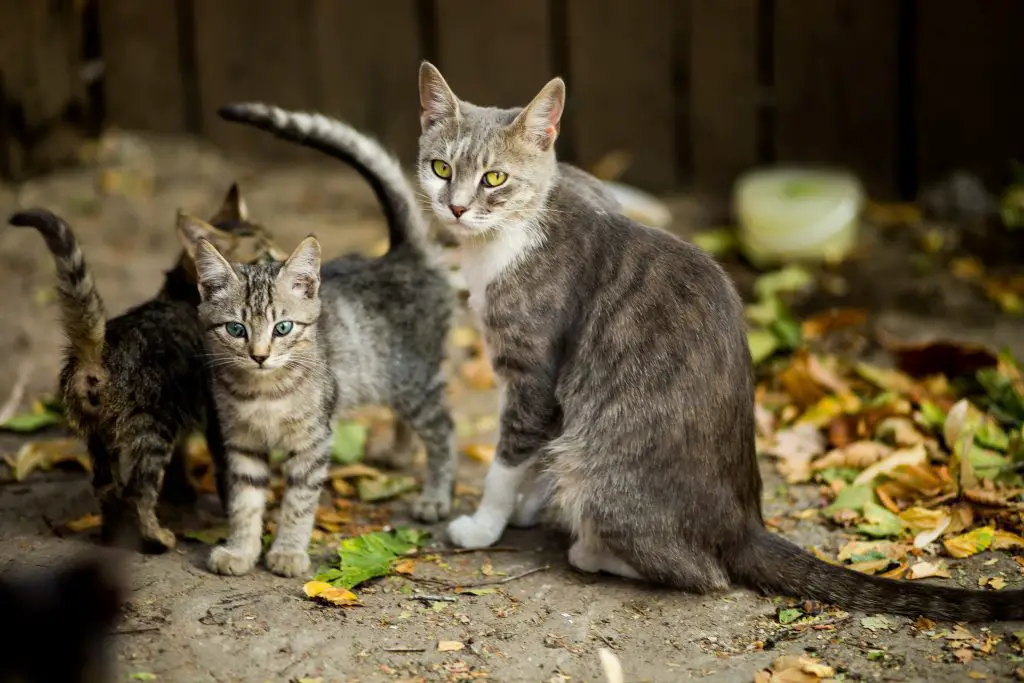
Yes. A cat mother can get pregnant with her own kittens but it is not recommended. Inbreeding can lead to health problems for the kittens. If this happens without your knowledge, it is best to take the pregnant cat to the veterinarian and discuss options.
The best way to prevent a kitten from impregnating his mother is to get him neutered. Neutering will not only prevent unwanted pregnancies, but it can also help reduce aggression and roaming behaviors in males. If you have an intact male kitten, make an appointment with your veterinarian to have him neutered as soon as possible.
You should also keep your kitten away from female cats who are not spayed. Unspayed female cats can go into heat multiple times per year. If they are around an intact male cat, there is a good chance they will become pregnant.
Inbreeding cats is not recommended because it can lead to genetic defects in the offspring. Cats that are inbred are also more likely to be aggressive and have health problems. Additionally, inbreeding decreases the genetic diversity of a population, which can make the population more susceptible to disease. Finally, inbreeding can also result in lower birth rates and smaller litter sizes.
There are several reasons why you should avoid breeding cats that are too closely related. Inbreeding can lead to genetic defects in the kittens, including heart defects, deafness, and blindness. Kittens from two closely related parents are also more likely to be born with congenital diseases.
Additionally, inbreeding can make cats more aggressive and less able to withstand diseases. Inbreeding can also lead to a smaller gene pool, which can make it more difficult to find healthy mates for future generations of cats.
What Happens During a Normal Cat Birth?
A normal cat birth involves several stages including pre-labor, active labor, and post-birth recovery, each characterized by distinct behaviors and physical changes.
Pre-Labor
Pre-labor is the first stage of a cat’s birthing process, where the mother cat may show signs of restlessness, loss of appetite, and nesting behavior. In my practice as a veterinarian, I’ve seen many cats start seeking out quiet, secluded areas in preparation for the delivery. This stage can last anywhere from a few hours to a day.
Active Labor
Active labor begins when the mother starts having contractions and delivering her kittens. Typically, a mother cat will lay on her side and you might notice rhythmic spasms in her abdomen – these are contractions. Kittens are usually delivered every 30 to 60 minutes, each enclosed in a thin membrane that the mother will lick off. In my experience, most cats instinctively know what to do during this process, and human intervention is rarely needed.
Delivery of the Placenta
Following the birth of each kitten, the placenta is delivered. The mother cat will often eat the placenta, which is completely normal and provides her with essential nutrients. However, it’s important to ensure that a placenta is delivered for each kitten, as a retained placenta can lead to serious complications.
Post-Birth Recovery
After all the kittens and placentas have been delivered, the mother cat will clean her kittens and then settle down to nurse them. This is a critical time for the kittens to bond with their mother and begin nursing, as they need the colostrum found in the mother’s milk for essential antibodies.
How Can I Prevent My Kitten From Getting Pregnant?
Here is how to prevent your kitten from getting pregnant:
Step 1: Schedule a spay appointment
To prevent your kitten from getting pregnant, schedule a spay appointment with your veterinarian. Spaying is the surgical removal of a female cat’s reproductive organs, preventing them from becoming pregnant. Most veterinarians recommend spaying kittens around six months of age, but it can be done as early as eight weeks.
Step 2: Keep your kitten indoors
While waiting for the spay appointment, keep your kitten indoors to avoid contact with unneutered male cats. This reduces the risk of accidental mating and ensures your kitten stays safe and healthy.
Step 3: Monitor your kitten’s behavior
Pay attention to any changes in your kitten’s behavior that may indicate she is going into heat. Signs include increased vocalization, restlessness, and excessive grooming of her genitals. If you notice these behaviors, take extra precautions to keep her away from male cats.
Step 4: Consult your veterinarian
If you have concerns about your kitten’s reproductive health or are unsure about the spaying process, consult your veterinarian for advice. They can provide guidance on the best course of action for your kitten’s specific needs.
Step 5: Educate yourself on feline reproduction
Understanding feline reproduction and the risks associated with early pregnancy can help you make informed decisions about your kitten’s health. Educate yourself on the topic and share your knowledge with other cat owners to promote responsible pet ownership.
Step 6: Encourage responsible pet ownership
Encourage friends, family, and neighbors with cats to spay or neuter their pets as well. By promoting responsible pet ownership, you can help reduce the number of unwanted kittens and contribute to a healthier feline population.
When Can Cats Become Pregnant Again?
Cats can become pregnant again almost immediately after giving birth, often as soon as two weeks postpartum.
In my years as a vet, I’ve seen cats go back into heat and become capable of conceiving again shortly after having a litter, sometimes within just two weeks. This is due to the nature of the feline reproductive cycle.
Cats are seasonally polyestrous, meaning they can have multiple heat cycles during certain times of the year. These cycles can resume quickly after giving birth, leading to potential back-to-back pregnancies.
However, it’s important to note that while a cat can become pregnant again so soon, it’s not necessarily ideal for her health. Pregnancy and nursing take a significant toll on a cat’s body, so immediate subsequent pregnancies can lead to exhaustion and depletion of vital nutrients.
Ideally, a nursing cat should wait a few months before becoming pregnant again to allow her body to recover from the previous pregnancy and birth. This rest period also gives her a chance to adequately care for and wean her current kittens without the added stress of a new pregnancy.
As a vet, I strongly recommend spaying your cats if you are not planning to breed them. This prevents unwanted pregnancies and contributes to better overall health for your pet.
How Many Times Can a Cat Get Pregnant in a Year?
A cat can potentially get pregnant multiple times in a year, with the possibility of birthing up to five litters depending on her heat cycles and overall health.
In my veterinary practice, I’ve seen that a cat’s reproductive cycle is quite unique compared to many other animals. A female cat, or queen, can go into heat multiple times throughout the year, often every two to three weeks.
Each heat cycle offers a window of fertility where the queen can become pregnant. Given that a typical cat pregnancy lasts about nine weeks, it’s theoretically possible for a cat to have several litters in a year, even up to five according to some sources.
However, it’s important to note that this high frequency of pregnancies can be physically taxing and potentially detrimental to a cat’s health.
Each pregnancy and subsequent nursing period places significant demands on the queen’s body, requiring extensive resources and energy. Continuous pregnancies without sufficient recovery time in between can lead to exhaustion, malnutrition, and other health problems.
In addition, overpopulation is a serious issue in many communities, with countless cats and kittens ending up in shelters or living as strays. As a vet, I strongly advocate for responsible pet ownership, which includes spaying and neutering pets to prevent unwanted litters.
Spaying also has the added benefits of reducing certain health risks and often leading to calmer, more content pets.
FAQs
Q: At what age can a female kitten get pregnant?
A: Female kittens can become pregnant as early as four months of age.
Q: Can a kitten give birth to a litter of kittens safely?
A: It is not safe for a kitten to give birth to a litter of kittens. They are not fully developed yet and do not have the physical maturity to handle a pregnancy and birthing.
Q: What should I do if I suspect my kitten is pregnant?
A: If you suspect your kitten is pregnant, take her to the vet right away and have her checked. Your vet can advise you on what steps to take next.
Q: How many kittens can a cat have in one litter?
A: The number of kittens a cat can have in one litter varies, but it can be anywhere from one to eight or more.
Q: Is it dangerous for a cat to have too many kittens?
A: Yes, it can be dangerous for a cat to have too many kittens. Larger litters can cause complications during the birthing process, and it can be difficult for the mother cat to care for all the kittens properly.
Q: Can a male kitten get another cat pregnant?
A: Male kittens can impregnate a female cat if they are unneutered. It is important to have your kittens neutered or spayed before they reach four months of age.
Q: What should I feed my pregnant kitten?
A: Pregnant kittens need a balanced diet with plenty of protein and nutrients. Consult with your veterinarian to determine the best food for your kitten’s specific needs.
Q: What should I do if my cat is about to give birth?
A: Set up a birthing area with old towels, and give your cat space and privacy. Monitor her closely and contact your veterinarian if you notice any signs of illness or complications during the birth.
Q: What is the best way to care for newborn kittens?
A: The mother cat will take care of most of the care for newborn kittens, but it is important to provide a warm, safe environment and monitor their health closely. Consult with your veterinarian for specific advice on caring for newborns.
Q: When should I get my kitten spayed or neutered?
A: You should have your kitten spayed or neutered before they reach four months of age to prevent unwanted pregnancies and health issues associated with not spaying or neutering.
Conclusion and final thoughts
It is indeed dangerous for a kitten to get pregnant. Allowing a kitten to breed before reaching full maturity puts her health and the health of her offspring at risk.
Complications such as difficult labor, malnutrition, and stunted growth can arise due to the kitten’s underdeveloped body.
To prevent these risks, it’s crucial for pet owners to spay their kittens before they reach sexual maturity, typically around six months of age.
By doing so, not only do we protect our beloved pets, but we also contribute to controlling the population of stray cats and promoting responsible pet ownership.




